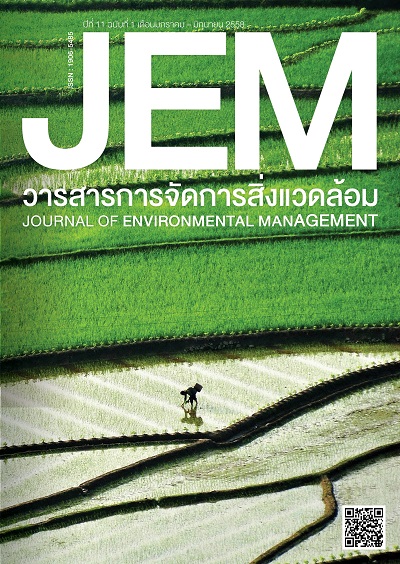การประเมินการบริการที่เป็นมิตรกับสิ่งแวดล้อมของสถานประกอบการประเภทโรงแรมในเขตภาคเหนือตอนล่าง Assessment of Environmentally-Friendly Services of Hotels in the Lower Northern Part of Thailand
DOI:
https://doi.org/10.14456/jem.2015.6บทคัดย่อ
งานวิจัยนี้เป็นการศึกษาสถานการณ์การจัดการทางด้านสิ่งแวดล้อมและประเมินการบริการที่เป็นมิตรกับสิ่งแวดล้อมของสถานประกอบการประเภทโรงแรมในเขตภาคเหนือตอนล่าง จำนวน 63 โรงแรม เครื่องมือสำหรับงานวิจัยนี้ใช้การสังเกตและการสัมภาษณ์แบบมีโครงสร้างด้วยคำถามที่อ้างอิงตามเกณฑ์มาตรฐานสถานประกอบการที่พักสีเขียวของกรมส่งเสริมคุณภาพสิ่งแวดล้อม พ.ศ.2558 ซึ่งเกณฑ์มาตรฐานสถานประกอบการที่พักสีเขียวประกอบด้วยปัจจัยหลัก 3 หมวด และปัจจัยพิจารณาเฉพาะพื้นที่ 1 หมวด ผลการศึกษาพบว่ามีโรงแรมที่ผ่านการประเมินการบริการที่เป็นมิตรกับสิ่งแวดล้อมในระดับ Gold Class ร้อยละ 41.27 รองลงมา อยู่ในระดับ Bronze Class และ Silver Class คิดเป็นร้อยละ 22.22 และ 19.05 ตามลำดับ อย่างไรก็ตามยังมีโรงแรมที่ไม่ผ่านเกณฑ์มาตรฐานการบริการที่เป็นมิตรต่อสิ่งแวดล้อมถึงร้อยละ 17.86 โดยพบว่าสถานประกอบการประเภทโรงแรมมากกว่าร้อยละ 50 ยังขาดการจัดการสภาพจัดภูมิทัศน์ของพื้นที่ การจัดให้มีการบริการและช่องทางการสื่อสารที่หลากหลาย การจัดการการใช้พลังงาน การจัดการน้ำที่มีประสิทธิภาพ การจัดการระบายน้ำ การบำบัดน้ำเสีย โดยเฉพาะอย่างยิ่งด้านการจัดการสาธารณสุขและการส่งเสริมสุขภาพ การจัดการป้องกันและระงับอัคคีภัย อีกทั้งในเรื่องของการขาดการมีส่วนร่วมเป็นสมาชิกที่ดีของชุมชนในการส่งเสริมและสนับสนุนกิจกรรมต่างๆ ของท้องถิ่นที่ทางโรงแรม และภาพลักษณ์การบริหารจัดการธุรกิจที่เป็นมิตรกับสิ่งแวดล้อม
This research aimed to study the environmental management and to assess the environmentally-friendly services of 63 hotels in the lower northern part of Thailand. Observation and structured interviews based on green accommodation standard of the Department of Environmental Quality Promotion of B.C.2015 were used as a tool for this research. The green accommodation standard included three categories of core factors and one category of area-based specific factors. The results showed that 41.27% of the hotels passed the environmentally-friendly service standard at the Gold Class level , followed by the Bronze Class and Silver Class levels at 22.22% and 19.05%, respectively. However, 17.46% of the hotels were below the standard for environmentally-friendly services. More than 50% of the total hotels still lacked environmental management, including landscape management, provision of service packages and communication channels, efficient energy and water management, drainage management and wastewater treatment. Especially, the management of public health and health promotion, fire prevention and safety management, and participation as community members by promoting and supporting activities in the local community and building an environmentally-friendly image were seen to be lacking.
เอกสารอ้างอิง
Department of Alternative Energy Development and Efficiency. (2008). Energy report of the year 2006 [In Thai: รายงานพลังงานของประเทศไทยปี 2549]. Ministry of Energy, Thailand.
International Finance Corporation. (2007). Environmental Health and Safety Guidelines for Tourism and Hospitality Development.
Kasikornbank. (2014). Tourism Business in the North of Thailand [In Thai: ธุรกิจท่องเที่ยวภาคเหนือ]. Retrieved May 20, 2015, from http://www.ksmecare.com/Article/82/31905/ธุรกิจท่องเที่ยวภาคเหนือ.
Lorsomboon, P., Budrat, P., Silngarmlerd, S., Suttijannapa, K., Neimsuwan, S. & Likitaporn, C. (2000). Project on developing environmental indicators for enhancing industrial competitiveness in Thailand [In Thai: โครงการพัฒนาดัชนีสิ่งแวดล้อมเพื่อเพิ่มขีดความสามารถในการแข่งขันของอุตสาหกรรมไทย]. Thailand Environment Institute Foundation, Thailand.
Ministry of Interior. (2008). Ministerial Regulation Specifying Categories and Criteria for Hotel Business Act B.E.2008 [In Thai: กฎกระทรวงกำหนดประเภทและหลักเกณฑ์การประกอบธุรกิจโรงแรม พ.ศ.2551]. Retrieved November 5, 2014, from http://download.asa.or.th/03media/04law/ha/ mr51.pdf.
Ministry of Public Health. (1999). Public Health Act, B.E. 2535 (A.D. 2007) [In Thai: พระราชบัญญัติสาธารณสุข พ.ศ. 2535]. Retrieved November 5, 2014, from http://www.moph.go.th/ops/minister_ 06/Office2/public%20health%20law.pdf.
Mongkolruedee, P. (2010). Environmental management and performance of business: Case study of hotels in Thailand [In Thai: การจัดการสิ่งแวดล้อมกับผลการดำเนินงานของธุรกิจ: กรณีศึกษาโรงแรมในประเทศไทย]. Master’s Thesis, Thammasat Business School, Thammasat University.
Northern Region Economic and Social Development Office (NESO). (2012). Direction for developing provinces in the North of Thailand [In Thai: ทิศทางการพัฒนากลุ่มจังหวัด/จังหวัดภาคเหนือ]. Retrieved May 20, 2015, from http://eris.nesdb.go.th/pdf/401003-002.pdf.
Office of Small and Medium Enterprises Promotion (OSMEP). (2008). The Hotel Act B.E 2547 Section 34. [In Thai: พระราชบัญญัติโรงแรม พ.ศ. 2547 มาตราที่ 34]. Retrieved November 7, 2014, from http://www.dip.go.th/Portals/0/patuemoh/pdf.
Parnasis, M. (1998). Environmental Management in Thai Hotel Industry, Canadian University Consortium, Asian Institute of Technology, Urban Environmental Management, Private Sector Initiative. Retrieved May 31, 2015, from http://www.ucalgary.ca/ev/designresearch/projects/2000/cuc/tp/outreach.
Rada, J. (1996). Designing and building eco-efficient hotels. Green Hotelier Magazine, 4, 10 – 11.
Robinot, E. & Giannelloni, J. (2010). Do hotels “Green” attributes contribute to customer satisfaction? Journal of Services Marketing, 24(2), 157 – 169.
Sirichodbundit, P. (2005). Marketing for service business [In Thai: การตลาดสำหรับธุรกิจบริการ]. Bangkok: Zatfour Printing.



